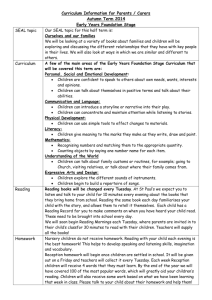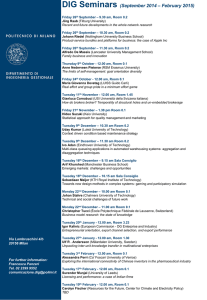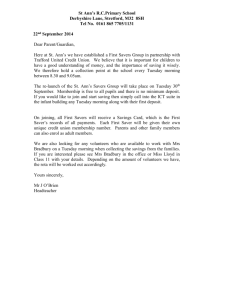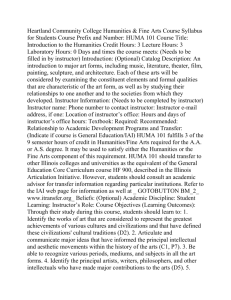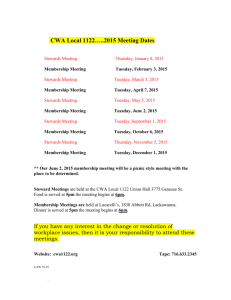CRJ206-02_Spr08_CB - Heartland Community College
advertisement
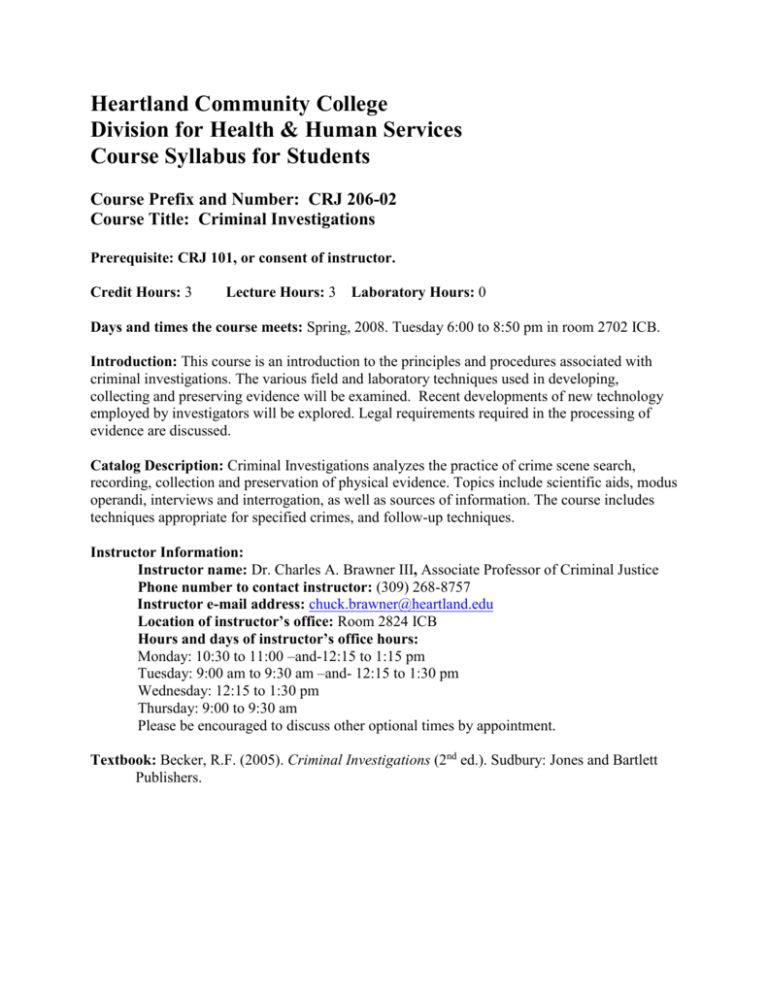
Heartland Community College Division for Health & Human Services Course Syllabus for Students Course Prefix and Number: CRJ 206-02 Course Title: Criminal Investigations Prerequisite: CRJ 101, or consent of instructor. Credit Hours: 3 Lecture Hours: 3 Laboratory Hours: 0 Days and times the course meets: Spring, 2008. Tuesday 6:00 to 8:50 pm in room 2702 ICB. Introduction: This course is an introduction to the principles and procedures associated with criminal investigations. The various field and laboratory techniques used in developing, collecting and preserving evidence will be examined. Recent developments of new technology employed by investigators will be explored. Legal requirements required in the processing of evidence are discussed. Catalog Description: Criminal Investigations analyzes the practice of crime scene search, recording, collection and preservation of physical evidence. Topics include scientific aids, modus operandi, interviews and interrogation, as well as sources of information. The course includes techniques appropriate for specified crimes, and follow-up techniques. Instructor Information: Instructor name: Dr. Charles A. Brawner III, Associate Professor of Criminal Justice Phone number to contact instructor: (309) 268-8757 Instructor e-mail address: chuck.brawner@heartland.edu Location of instructor’s office: Room 2824 ICB Hours and days of instructor’s office hours: Monday: 10:30 to 11:00 –and-12:15 to 1:15 pm Tuesday: 9:00 am to 9:30 am –and- 12:15 to 1:30 pm Wednesday: 12:15 to 1:30 pm Thursday: 9:00 to 9:30 am Please be encouraged to discuss other optional times by appointment. Textbook: Becker, R.F. (2005). Criminal Investigations (2nd ed.). Sudbury: Jones and Bartlett Publishers. Relationship to Academic Development Programs and Transfer: CRJ 206 fulfills 3 semester hours of elective credit for the A.A., A.S. or A.A.S. degrees. It should transfer to most colleges and universities as an elective course. However, since CRJ 206 it is not part of the General Education Core Curriculum described in the Illinois Articulation Initiative, students should check with an academic advisor for information about its transferability to other institutions. Course Objectives (Learning Outcomes): Upon completion of this course, students will: 1. Become familiar with the basic procedures and techniques used by the criminal investigator. 2. Attain experience in analyzing sample evidence, through a hands-on training approach. 3. Acquire a better understanding of the analytical skills necessary to examine physical evidence. 4. Acquire knowledge of how specific crime scenes are processed. 5. Increase their knowledge of the many occupations that employ investigators; both public and private. Course/Lab Outlines: I. A. History of Criminal Investigations B. Physical Evidence C. The Crime Scene D. Law of Search & Seizure E. Suspect Identification II. A. B. C. D. MCI Interrogation Death Investigation Sexual Assault III. A. Robbery B. Theft C. Burglary D. Arson E. Terrorism F. White-Collar Crime Course Policies: Method of Evaluation (Tests/Exams, Grading System): Your course grade will be determined through the following assignments: 1) There will be three (3) regularly scheduled examinations, each worth 100 points, for a total 300 points. 2) Course notebook. During the semester you will be assigned various projects regarding investigative cases, techniques, practices and technologies. At the end of the semester you will submit the projects in a notebook for points. The point value for the notebook will be 50 points. Grading Policy: 315 to 350 points = 90% - 100% A 280 to 314 points = 80% - 89% B 245 to 279 points = 70% - 79% C 210 to 244 points = 60% - 69% D 0 to 209 points = 59% or less F Participation (or Attendance): Please note you must be present for each activity, as class size, weather, locations, and number of activities will not allow for make-up assignments on an individual basis. Students are expected to attend all classes and participate meaningfully in the lab activities. Exams: Should you miss or be unable to attend a scheduled exam, you will have the opportunity to replace those missed points by taking the optional comprehensive exam at the end of the semester. I will release the scores and answers for each exam at the next class session following the exam. Once I release the scores and answers absolutely no opportunity for a make-up exam on that material will be feasible. Please do not ask for a make-up exam, after the results of the exam have been released to the class. Extra Credit: There is absolutely no provision for additional credit. Attendance: Students are expected to attend all classes and participate meaningfully in the activities each class day. Students are expected to be seated on a timely basis. The attendance policy for this course will follow the same guidelines as found on page 192 of the 2006-2008 Heartland Community College Catalog. Incompletes: The course policy for an incomplete will follow the same language found on page 177 of the 2006-2008 Catalog and Student Handbook. Student Conduct: I have a zero tolerance policy for classroom disruptions. I ask for your cooperation in making this an optimal learning environment for everyone. Therefore, please adhere to these expectations: 1) There is to be no talking between yourself and another student, unless I have opened a topic for general discussion among the entire class. 2) Speak politely and courteously toward each other. Be considerate of other’s opinions. 3) Do not bring cell phones, pagers, recording devices, nor children into my classroom. If present, I will ask that you remove them. Any student misconduct will be handled consistently with the language found on page 175 of the 2006-2008 Catalog and Student Handbook. Deadlines: See course calendar Required Writing and Reading: Required reading includes the class textbook and additional readings assigned in class, as well as keeping a notebook of classroom activities. Academic Integrity and Plagiarism Academic Integrity Academic integrity is a fundamental principle of collegial life at Heartland Community College and is essential to the credibility of the College’s educational programs. Moreover, because grading may be competitive, students who misrepresent their academic work violate the right of their fellow students. The College, therefore, views any act of academic dishonest as a serious offense requiring disciplinary measures, including course failure, suspension, and even expulsion from the College. In addition, an act of academic dishonesty may have unforeseen effects far beyond any officially imposed penalties. Violations of academic integrity include, but are not limited to cheating, aiding or suborning cheating or other acts of academic dishonesty, plagiarism, misrepresentation of data, falsification of academic records or documents and unauthorized access to computerized academic or administrative records or systems. Definitions of these violations may be found in the college catalog. Plagiarism Plagiarism is the presenting of others’ ideas as if they were your own. When you write a paper, create a project, do a presentation or create anything original, it is assumed that all the work, except for that which is attributed to another author or creator, is your own. Plagiarism is considered a serious academic offense and may take the following forms: 1 Copying word-for-word from another source and not giving that source credit. 2 Paraphrasing the work of another and not giving that source credit. 3 Adopting a particularly apt phrase as your own. 4 Using an image or a copy of an image without crediting its source. 5 Paraphrasing someone else’s line of thinking in the development of a topic as if it were your own. 6 Receiving excessive help from a friend or elsewhere, or using another project as if it were your own. Note that word-for-word copying is not the only form of plagiarism. The penalties for plagiarism may be severe, ranging from failure on the particular piece of work, failure in the course or expulsion from school in extreme cases. [Adapted from the Modern Language Association’s MLA Handbook for Writers of Research Papers. New York: MLA, 1995: 26] Academic Support Center Services: HCC Portal Just a reminder that to access WebCT, IRIS, and your Heartland Student Email, you will need to log into myHeartland, at https://my.heartland.edu. Library The Library, located in the Student Commons Buildings at the Raab Road campus, provides Heartland students with a full range of resources including books, online journal databases, videos, newspapers, periodicals, reserves, and interlibrary loan. Librarians are available to assist in locating information. For more information, please call the Library (309) 268-8200 or (309) 268-8292 Tutoring Services Heartland Community College offers tutoring in various forms at no cost to Heartland students at the Tutoring and Testing Center in Normal and at the Pontiac and Lincoln Centers. Tutors are available at convenient times throughout the week. Study groups are also available by request. For more information about services available at each location, please call the Tutoring and Testing Center in Normal (309) at 268-8231, the Pontiac Center at (815) 842-6777, or the Lincoln Center at (217) 735-1731. Testing Services The Tutoring and Testing Center provides a secure testing environment for students who are enrolled in online, hybrid, and other distance learning courses; have a documented disability; or need to take a make-up exam. Testing accommodations for students having documented disabilities must be arranged by the student through the Office of Disability Services, and Testing Services will only administer make-up exams at the request of the instructor. Contact Testing Services at (309) 268-8231 for more information. Open Computing Lab The Open Computing Lab provides free computing for HCC students at convenient times throughout the week. The computer lab is staffed by trained Lab Assistants and offers the use of approximately 70 computers, a scanner, a laser printer, and an electric typewriter. Notice of Canceled Class Sessions: Cancelled class sessions, for all HCC classes, will be listed under Cancelled Class Meetings in the A-Z Index and under Academic Information in the Current Students page on the HCC Web site. Go to http://www.heartland.edu/classCancellations/ to learn what classes have been cancelled for that day and the upcoming week. Be sure to check the last column, which might contain a message from the instructor. Syllabi disclaimer: This syllabus is a tentative schedule of readings and exam dates. The instructor reserves the right to change dates to accommodate any and all lab activities, as well as additional topics, guest speakers, weather or unforeseen scheduling conflicts. Course Calendar: Date Assignment Tuesday Jan. 15th Course introduction. Syllabus and Text review. Chapter 2: A Brief History of Investigations Tuesday Jan. 22nd Chapter 1: Introduction to Criminal Investigations Tuesday Jan. 29th Chapter 3: The Crime Scene Tuesday Feb. 5th Chapter 4: The Law of Search & Seizure Tuesday Feb. 12th Chapter 6: Suspect Identification Review for Exam #1 on Wednesday Tuesday Feb. 19th Take Exam #1 Tuesday Feb. 26th Chapter 7: Managing Criminal Investigations Tuesday March 4th Chapter 8: Interrogation Tuesday March 18th Chapter 10: Death Investigation Tuesday March 26th Chapter 13: Sexual Assault Tuesday April 1st Take Exam #2 Tuesday April 8th Chapter 12: Robbery Chapter 14: Theft & Burglary Tuesday April 15th Chapter 16: Arson Tuesday April 22nd Chapter 17: Terrorism Tuesday April 29th Chapter 19: White-collar Crime Tuesday May 6th Submit course work notebooks tonight. Take Exam # 3 Tuesday May 13th Return exam #3


